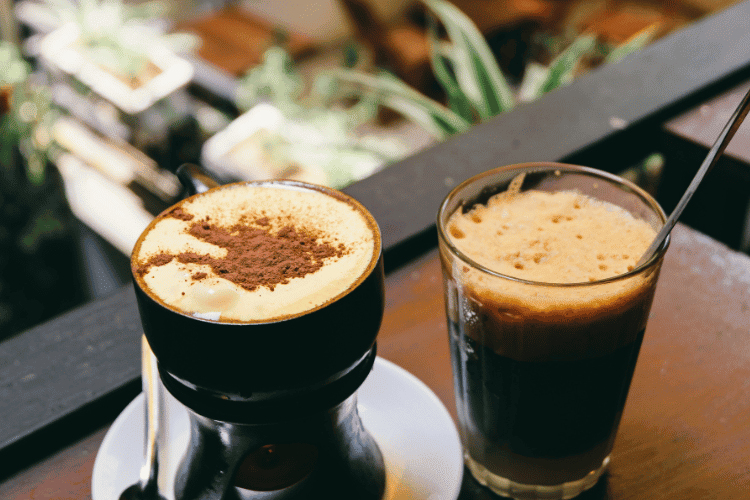If you’re a coffee enthusiast, nothing sets your morning right like that energy boost from caffeine. Among the popular drinks that help you achieve that is Vietnamese coffee. This dark, rich beverage pairs well with sweet, condensed milk, offering a delicious treat.
But how much caffeine is in Vietnamese coffee?
In this article, we’ll delve into Vietnamese coffee’s caffeine content and explore the factors influencing it. So, stick around!
How Much Caffeine in Vietnamese Coffee?
The caffeine content of Vietnamese coffee is around 100mg per cup. That’s around 50mg short of two shots of espresso.
Additionally, compared to the 65mg found in a standard cup of regular coffee, Vietnamese coffee is a robust and energizing brew.
The secret behind this potent kick lies in the choice of coffee plant. This drink is crafted using robusta beans.
This unique blend contributes to the bold and intense flavor profile that sets Vietnamese coffee apart.
Factors That Affect Caffeine Content in Vietnamese Coffee
Several factors can cause Vietnamese coffee to vary in caffeine content. These include the type of coffee bean, the brewing method, the roast level, and even the water temperature.
Let’s dive into each factor and uncover how it shapes the caffeine kick in your cup of coffee!
1. Type of Coffee Bean
Not all coffee species are equal. Not only can the bean type impact the flavor, but it also affects the caffeine level.
As you know, robusta beans are the reason why Vietnamese coffee is a powerhouse. Compared to arabica, robusta beans pack 1.4 to 1.8 times more caffeine. Why?
It’s in the genes! Certain genes in robusta, like CaXMT1 and CaMXMT1, crank up the caffeine levels during bean maturation.
Studies extracting the caffeine content from both coffee plants show that robusta consistently outperforms arabica. So, when you savor that robust Vietnamese brew, you can expect to get an extra jolt compared to good old American coffee.
2. Roast Level
As you might know, the roasting process affects the taste of coffee grounds. So, it’s natural to assume that the caffeine amount changes as well. However, despite common beliefs, lighter roasts have higher caffeine levels than dark ones.
That’s because heat can change the bean’s composition. It expels moisture and causes caffeine to break down. For instance, a study found light roast contained about 60 mg of caffeine, while dark roast had 51 mg.
While the difference isn’t that significant, those extra milligrams of caffeine can provide the perfect morning boost.
3. Brewing Method
The brewing method not only affects the taste and aroma but also the biochemical composition of your Vietnamese coffee. This mainly has to do with the brew time.
Generally, the shorter the duration, the higher the caffeine content. For instance, coffee brewed for 13 seconds in espresso machines had more caffeine than that prepared in cold brews.
Still, other factors come into play. As you know, the ground coffee-to-water ratio differs from one method to another. The higher the water content, the lower the caffeine becomes.
For the highest caffeine amount, choose a fast-brewing method, ample coffee grounds, and minimal water.
4. Water Temperature
The temperature of your water transforms the caffeine dynamics in your Vietnamese coffee. Caffeine’s solubility begins at 20 °C (1.46 mg/mL), intensifies at 80 °C (180 mg/mL), and peaks at 100 °C (670 mg/mL).
As you can see, lower temperatures slow down the caffeine extraction process. In contrast, hot water at around 100ºC produces the highest amount of this chemical in a brew.
For that reason, espresso machines, reaching temperatures around 92–94 °C, are the best method to get the most caffeine out of your coffee grounds.
Why Is Vietnamese Coffee Strong?
Vietnamese coffee boasts a robust flavor for several reasons. For one, the beans endure an extended roast, crafting a darker, more flavorful profile.
Additionally, robusta beans have extra caffeine, which intensifies the brew taste. Not to mention, the common brewing method using a Phin filter allows the grounds to steep longer, adding to the richness of the coffee.
Because of its bold flavors, this strong coffee pairs well with the sweet creaminess of condensed milk.
How Much Caffeine Is Too Much?
Generally, healthy adults can consume up to 400 milligrams of caffeine daily. This aligns with the approximate caffeine content found in four cups of brewed Vietnamese coffee without milk or creamers.
It’s essential, however, for teenagers to exercise caution and restrict their caffeine intake to less than 100 mg per day. That’s equivalent to one 8-ounce cup of coffee or approximately two cans of cola.
That said, you should be mindful of individual sensitivities and health conditions, as caffeine tolerance can vary from one person to another. It’s best to consult with your healthcare provider to ensure that your caffeine consumption remains within an acceptable range.
Is Caffeine Harmful?
Yes, caffeine can be harmful. While moderate caffeine intake can offer benefits like increased energy and improved performance, overconsumption may lead to adverse effects.
That’s especially true for individuals with existing heart conditions or anxiety disorders, as they may be more susceptible to the effects of caffeine.
Short-term side effects of excessive caffeine intake include insomnia, anxiety, heart palpitations, dehydration, high blood pressure, heartburn, and stomach upset. Additionally, caffeine’s diuretic effect contributes to dehydration.
Long-term risks include the potential for caffeine toxicity, which can pose serious health risks.
Aside from that, caffeine withdrawal symptoms, such as headaches and rebound fatigue, may occur when abruptly reducing intake.
Wrapping Up
Figuring out how much caffeine is in Vietnamese coffee can help you make informed choices and maintain a balanced coffee routine.
Generally, Vietnamese coffee contains approximately 100mg of caffeine, providing a robust and energizing kick. Factors like the bean type, roast level, brewing method, and water temperature contribute to the total amount.
Understanding this information allows you to enjoy Vietnamese coffee responsibly. That way, you can monitor your caffeine intake and align it with health guidelines.












